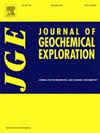GEMAS:硼作为欧洲农业土壤风化的地球化学替代物
IF 3.4
2区 地球科学
Q1 GEOCHEMISTRY & GEOPHYSICS
引用次数: 0
摘要
大约一个世纪前,人们就认识到硼是植物和陆地生物正常生长所必需的元素。在农业系统中,尤其是在高度风化的土壤中,植物的生长受到了限制。由于硼需要特殊的分析技术,因此很少对整个岩石或土壤进行分析。通常是在部分萃取(王水或 CaCl)后,对数量有限的样本进行测定。我们介绍了在 GEMAS(农业和牧场土壤地球化学绘图)大陆尺度项目中收集的 33 个欧洲国家(560 万平方公里)的农业土壤样本(0-10 厘米)中的硼含量。欧洲农业土壤中的硼含量是在热王水提取后通过 ICP-MS 测定的,从 0.5 毫克/千克到 49 毫克/千克不等(中位数为 2.42 毫克/千克,n = 2108),这与上大陆结壳的硼总估计值(17-47 毫克/千克)有些相似。硼在农业土壤中的空间分布呈现斑块状,在花岗岩基岩地区含量较低,而在石灰岩和火山地区形成的土壤中含量较高。硼在土壤中的地球化学行为在很大程度上取决于其他因素,如 pH 值、CEC、有机物的存在、粘土以及次生氧化物和氢氧化物。在大陆范围内绘制耕地土壤中的硼地球化学图,可以调查植物的健康状况,即硼的营养状况对植物的有利和不利影响。本文章由计算机程序翻译,如有差异,请以英文原文为准。
GEMAS: Boron as a geochemical proxy for weathering of European agricultural soil
About a century ago, B was recognised as an essential element for the normal growth of plants and terrestrial organisms. Limitations for plant development have been recognised in agricultural systems, particularly in highly weathered soil. Boron is rarely analysed in whole rock or soil analysis, as it requires specific analytical techniques. It is often determined, after partial extraction (aqua regia or Ca![]() Cl), usually on a limited number of samples. Many more questions than answers exist about the environmental behaviour of B.
Cl), usually on a limited number of samples. Many more questions than answers exist about the environmental behaviour of B.
We present B contents in agricultural soil samples (0–10 cm) collected in 33 European countries (5.6 million km2) during the GEMAS (GEochemical Mapping of Agricultural and grazing land Soil) continental-scale project. The B content, determined by ICP-MS following hot aqua regia extraction, varies in European agricultural soil from 0.5 to 49 mg/kg (median 2.42 mg/kg, n = 2108), which is somewhat similar to total B estimates for the Upper Continental Crust (17–47 mg/kg). Its spatial distribution in agricultural soil shows a patchy pattern with low values in regions with granitic bedrock and high contents in soil formed over limestone and in volcanic areas.
Boron geochemical behaviour in soil is strongly dependent on other factors such as pH, CEC, presence of organic matter, clay and secondary oxides and hydroxides. Boron geochemical mapping at the continental scale in arable soil allows investigations of plant health, i.e., the beneficial and adverse effects due to the nutritional status of boron.
求助全文
通过发布文献求助,成功后即可免费获取论文全文。
去求助
来源期刊

Journal of Geochemical Exploration
地学-地球化学与地球物理
CiteScore
7.40
自引率
7.70%
发文量
148
审稿时长
8.1 months
期刊介绍:
Journal of Geochemical Exploration is mostly dedicated to publication of original studies in exploration and environmental geochemistry and related topics.
Contributions considered of prevalent interest for the journal include researches based on the application of innovative methods to:
define the genesis and the evolution of mineral deposits including transfer of elements in large-scale mineralized areas.
analyze complex systems at the boundaries between bio-geochemistry, metal transport and mineral accumulation.
evaluate effects of historical mining activities on the surface environment.
trace pollutant sources and define their fate and transport models in the near-surface and surface environments involving solid, fluid and aerial matrices.
assess and quantify natural and technogenic radioactivity in the environment.
determine geochemical anomalies and set baseline reference values using compositional data analysis, multivariate statistics and geo-spatial analysis.
assess the impacts of anthropogenic contamination on ecosystems and human health at local and regional scale to prioritize and classify risks through deterministic and stochastic approaches.
Papers dedicated to the presentation of newly developed methods in analytical geochemistry to be applied in the field or in laboratory are also within the topics of interest for the journal.
 求助内容:
求助内容: 应助结果提醒方式:
应助结果提醒方式:


